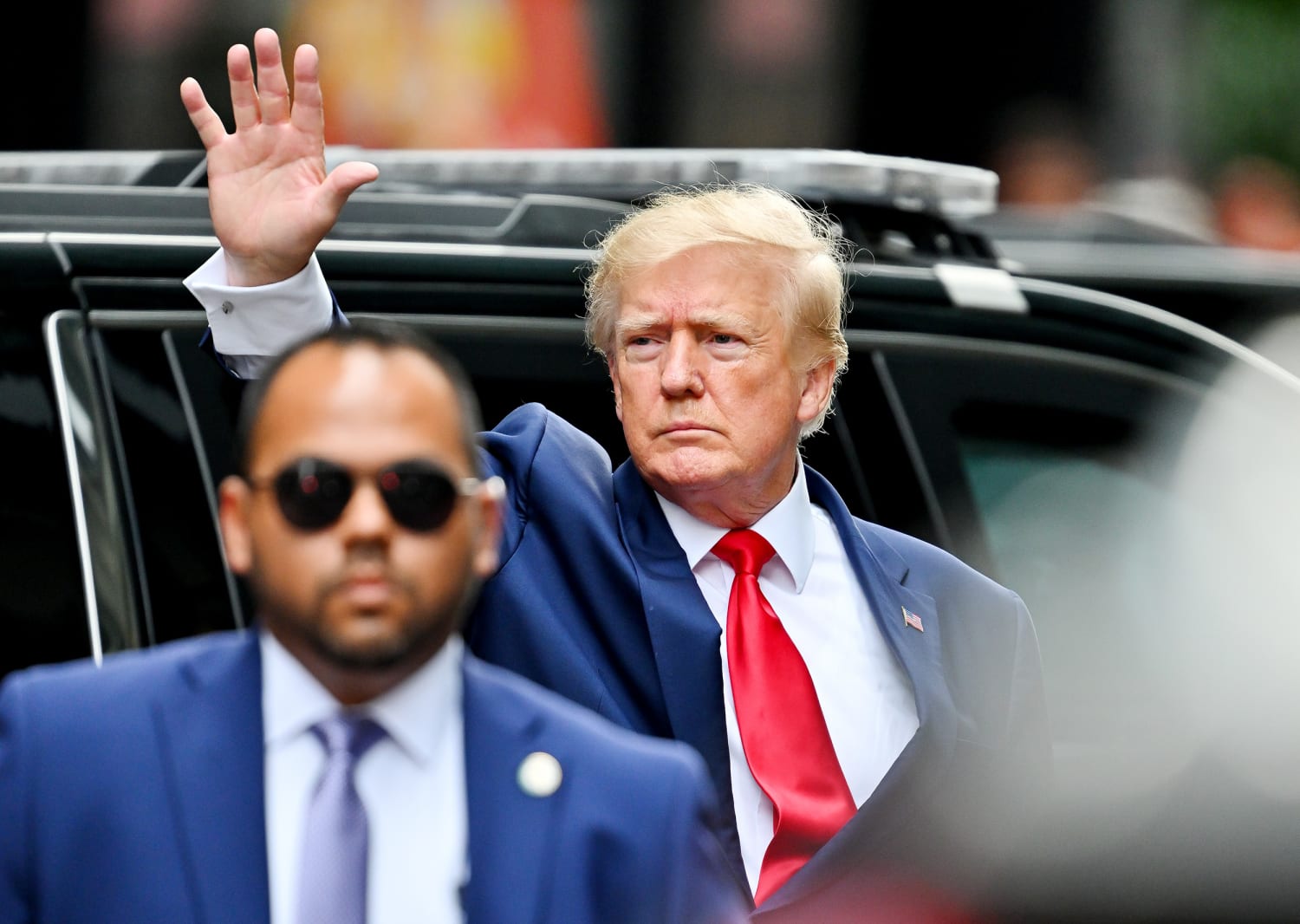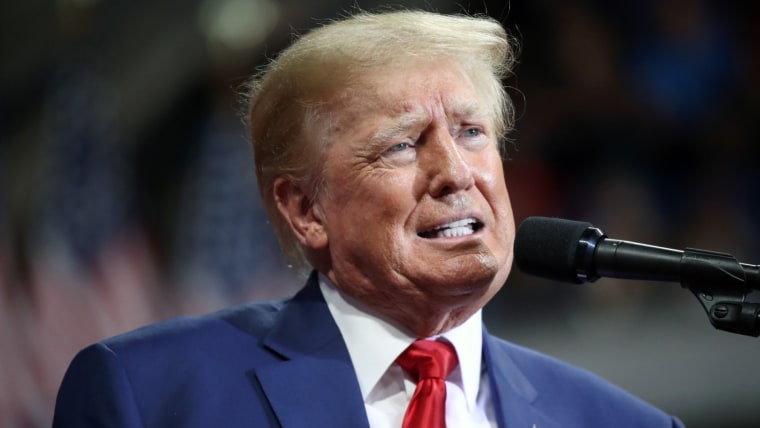Over the past 16 months, the federal government sent letters and emails, made phone calls, issued a criminal subpoena and finally executed a search warrant to retrieve a bewildering number of sensitive government records from former President Donald Trump’s Mar-a-Lago home and club in Palm Beach, Florida.
Listed in two Department of Justice court filings filed in as many weeks, the paper trail of records lay out a roadmap for what could be the first criminal indictment of a former president, according to legal experts and former Justice Department officials who spoke to NBC News and say Attorney General Merrick Garland probably has enough evidence now to charge Trump with mishandling national defense information and obstruction of justice.
But it’s a singularly complicated task, wrought with myriad difficulties — chiefly the explosive political proposition of indicting a former president — that no attorney general has faced before, according to Garland’s predecessors, former prosecutors and seasoned federal defense attorneys.
“The attorney general is not in a monastery, unconnected to the world that surrounds him,” former Attorney General Eric Holder, who was appointed by President Barack Obama, said in an interview, discussing the complications of the case. “And yet, your primary responsibility is to enforce the law.”
Garland has repeatedly emphasized that his decisions are driven by the “facts and the law.” And Holder, other former prosecutors and one of his Republican predecessors as attorney general say they trust him. But in weighing whether to charge a political figure, Holder acknowledged that “some part of the calculus is the impact of any prosecution decision” on the country.
Under federal guidelines, prosecutors aren’t supposed to charge if they don’t believe there’s enough evidence to ensure the probability of sustaining a conviction, a difficult consideration in any case, because they need to impanel 12 impartial jurors to unanimously agree on a verdict. The problem is magnified to historic proportions by a polarizing figure like Trump as he positions himself for a possible rematch against President Joe Biden, who appointed Garland.
Trump’s status as a former president played in his favor Monday, when a federal judge he appointed in the Southern District of Florida, Aileen Cannon, shocked legal experts by temporarily halting some aspects of the criminal investigation to allow a yet-to-be-appointed third-party “special master” review of all the documents and records seized from Mar-a-Lago in the Aug. 8 search.
Cannon’s ruling gave a measure of credence to Trump’s argument, hotly disputed by the Justice Department and legal experts across the political spectrum, that a former president could assert executive privilege claims over records the government argues weren’t his to possess.
“The Court takes into account the undeniably unprecedented nature of the search of a former President’s residence,” Cannon wrote, emphasizing that with Trump’s “former position as President of the United States, the stigma associated with the subject seizure is in a league of its own.”
Many legal experts roundly criticized the ruling, particularly the unprecedented decision that a special master should be authorized to wade into thorny issues of executive privilege. But it was hailed publicly and privately by Trump, his advisers and confidants, four of whom spoke to NBC News on condition of anonymity to freely describe conversations with, and the state of mind of, the former president.
“What you saw with Cannon you’re going to see over and over again, and I’m not sure Justice knows what it’s getting into,” said a confidant who spoke with Trump about the case. “This is a case about presidential records and executive powers. It’s got ‘Supreme Court’ written all over it. He’s going to go all out. And if it ever gets to trial, he’ll win. It takes just one juror to hang. Those are good odds.”
Another complication that Garland has to contend with: the highly classified and confidential nature of the evidence. The government doesn’t want the information publicized, which experts interviewed by NBC News say could give Trump more leverage to “graymail” the government— threatening to reveal secrets to sway legal proceedings — by demanding its disclosure in open court.
Special court procedures make some classified information public, but Trump’s advisers say he’ll fight over every document.
“Think about the logistics of the case: You’re going to have secret evidence decided in secret hearings, a court with no cameras allowed, and you’re going to try the political opponent of the man who appointed you?” another Trump adviser said.
“Our default position is disclose everything.”
Attorneys familiar with the way classified information is used in court dispute the notion that the procedures would be entirely secret or that Trump wouldn’t get a fair hearing, but they acknowledge the government’s difficulties given the sensitive nature of the evidence.
Phil Lacovara, who was part of the special prosecutor’s team that investigated Richard Nixon over Watergate, described the graymail situation confronting Garland as “a Catch 22: The same evidence that makes the case seem so damning might make it difficult to prosecute him.”
David Laufman, the former head of the counterintelligence and export control section of the Justice Department’s National Security Division, said the government would need to take a “thoughtful approach” to deciding what documents could be disclosed in the discovery phase and ahead of a potential trial.
It would have to choose documents that point to a defendant’s criminal liability but that aren’t so sensitive that putting them into evidence would worsen the risk of compromising intelligence sources and methods.
“Some people refer to it as kind of choosing the ‘Goldilocks documents’ to put into evidence,” Laufman said, meaning documents that weren’t too hot or too cold, but just right.
Richard Gregorie, a former prosecutor in the Southern District of Florida who used classified information in the successful prosecution of former Panamanian President Manuel Noriega, said he worked on cases that couldn’t be brought because of the nature of the evidence, and he didn’t have to contend with a former U.S. president, either.
“This is not just any defendant,” Gregorie said. “This is a former president of the United States who was reckless and negligent in the performance of his duties. The voters who put him in office knew his character flaws and voted for him anyway.”
Echoing others, Gregorie said he believes Garland has enough “substantial evidence to prove to a jury beyond a reasonable doubt” that Trump may have violated various federal laws concerning national defense documents. And, he said, Trump could have conspired to obstruct justice on June 3 when one of his lawyers signed a false declaration, drafted by yet another lawyer, stating that he no longer had various records at Mar-a-Lago that the Justice Department sought in a federal subpoena.
There were 103 such records — amounting to hundreds of pages — among the more than 11,000 government documents seized on Aug. 8 after the FBI executed a search warrant.
Trump, however, didn’t sign the false declaration himself, making it more difficult for the government to charge him with obstruction without other evidence in the saga, which began when the National Archives reached out to him to recover documents under the Presidential Records Act in May 2021. From then until the Mar-a-Lago search, Trump has given over or has had seized 60 documents marked “TOP SECRET,” 162 labeled “SECRET” and 103 more marked “CONFIDENTIAL.”
The Washington Post reported Tuesday that one document “described a foreign government’s military defenses, including its nuclear capabilities,” citing people familiar with the matter. The report, which the Justice Department would not comment on, did not detail what classification markings, if any, were on this document, and NBC News has not independently confirmed the report.
Trump has never explained why he had so many sensitive records, other than to say through spokespeople that he had a right to them, which the government disputes.
If Trump is charged, his advisers say, a top concern is to keep the case out of Washington, D.C., where the image of Trump supporters ransacking the U.S. Capitol on Jan. 6, 2021, in an effort to thwart the peaceful transfer of power looms large. Jury pools often mirror voters, and Trump got only 5.4% of the vote in Washington in 2020. In contrast, in the counties comprising the region of the Southern District of Florida where Mar-a-Lago sits, Trump won 48% of the vote.
Jury selection will be of crucial importance for Garland to consider, according to former Attorney General Alberto Gonzales, who echoed Holder in saying he trusts Garland’s judgment.
“You have to consider the fact that on a jury all it takes is one to say: ‘You know what? I’m not convinced.’ Despite the best case you can possibly imagine, there may be one person on that jury who says, ‘I think the election was stolen, and I am not going to vote guilty here,’” said Gonzales, an appointee of former President George W. Bush who left his post amid political controversy.
“I’m going to say this using layman’s terms: If you’re going to go after the former president, then you better get him, meaning you need to be successful in prosecuting him,” said Gonzales, who oversaw the prosecution of a Democratic congressman, William Jefferson of Louisiana, for taking bribes from an undercover FBI agent in 2006.
Bradley Moss, a national security law expert who believes the evidence is in favor of Trump’s being charged, said Trump is benefiting from his political profile and hasn’t espoused a coherent defense or reason for possessing the documents, a position echoed by other experts in the law.
“Trump is certainly being treated with kid gloves, and that’s part and parcel of the fact that he was the president. There are certain legal benefits that are attached even to a former president’s status, and there are political considerations,” Moss said.
“If brought to an indictment, I don’t view it as a tough case to prove,” Moss said. “But it’s a case rife with political risks, and it’s one that Trump will try to drag out and avoid a conviction until November 2024, when he hopes to get elected president again and a prosecution becomes basically impossible.”
Chuck Rosenberg, an NBC News and MSNBC legal analyst who oversaw 9/11 prosecutions and has used classified information in court, said the weight of the alleged crime matters, too, noting that “presidents are different” from regular people.
“You can’t lose a case against the former president. It will be so destructive for the country,” he said. “I think you bring a case where you have compelling evidence of a very serious crime: sedition, insurrection, conspiracy to defraud the United States.”
In a court hearing last week, Trump’s legal team previewed some of its potential legal defense, which seeks to make the controversy a dispute about records management and storage, not endangering national security, comparing it to a case of overdue library books, a metaphor expanded on by Mike Davis, a conservative attorney who has advised Trump’s legal team informally.
“This is like the librarian calling the police for overdue books that don’t belong to the library,” Davis said, espousing the widely contested view that the former president had expansive rights to the documents that can’t be compared to those of any other citizen except another former occupant of the White House.
But even Trump’s former attorney general William Barr disputes that notion. He told Fox News on Wednesday that prosecutors appear to be “getting very close to that point” of indicting Trump on a “technical case.”
But Barr then questioned the wisdom of charging a former president: “What will that do to the country? What kind of precedent will that set? Will the people really understand that this is not, you know, failing to return a library book, that this was serious? And so, you have to worry about those things. And I hope that those kinds of factors will incline the administration not to indict him, because I don’t want to see him indicted as a former president.”
Barr avoided charging then-President Trump with obstructing justice in the Russia investigation in 2019, relying on a legal rationale that has been criticized as questionable. But he has soured significantly on Trump.
“People say this was unprecedented. Well, it’s also unprecedented for a president to take all this classified information and put them in the country club,” Barr said on Fox News in a different interview earlier this week.
That’s a point on which Barr and Holder, two former attorneys general who don’t see eye to eye on many issues, agree.
“When they say we’ve never had a raid, as they characterize it, of a former president’s house, well, yeah, but we’ve never had a president who left the White House with classified documents and stored them at his house and then refused to turn them over after meetings, after subpoenas,” Holder said.
Holder said he believes Garland has the “intestinal fortitude” to charge Trump if the facts and the law support such a prosecution, and emphasized that the former president’s status — as well as the threats against the FBI and the Justice Department — shouldn’t factor into Garland’s ultimate decision.
“If we’re truly to be a system of laws and not men, all that argues for doing what Merrick Garland says he’s going to do,” Holder said. “Apply the law, apply the facts without fear or favor — and without fear is just as important as without favor.”
Source: | This article originally belongs to Nbcnews.com










